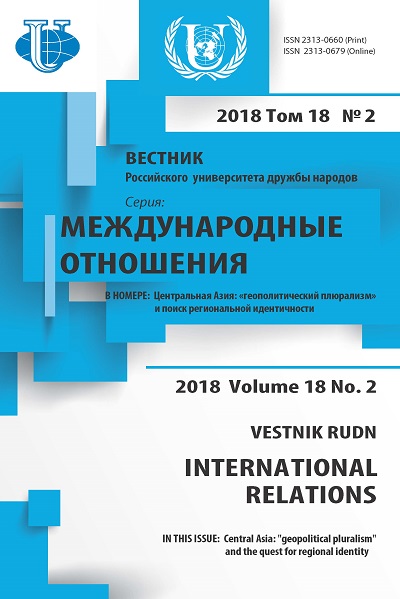THE ROLE OF CENTRAL ASIAN COUNTRIES IN THE FUEL AND ENERGY COMPLEX OF KYRGYZSTAN: THE STATE, PROBLEMS AND PROSPECTS
- Authors: Beisebaev RS1
-
Affiliations:
- Bishkek Humanities University named after Kuseyin Karasayev
- Issue: Vol 18, No 2 (2018): Central Asia: “geopolitical pluralism” and the quest for regional identity
- Pages: 284-291
- Section: THEMATIC DOSSIER
- URL: https://journals.rudn.ru/international-relations/article/view/18880
- DOI: https://doi.org/10.22363/2313-0660-2018-18-2-284-291
Cite item
Full Text
Abstract
The need to study the Kyrgyz-Kazakh, Kyrgyz-Uzbek, Kyrgyz-Tajik interstate relations caused by the fact that there is a need to identify the cooperation framework in fuel and energy field. It is clear that Central Asian states were interdependent, but each individually played a role in the development of fuel and energy sector of Kyrgyzstan. Republic in bilateral relations with the neighboring countries of the region determines ways to improve the development of the fuel and energy complex, taking into account the issues of sovereignty and national interests. Kyrgyzstan, located in the neighborhood with these republics, does not use this advantage, but finds alternative partners. The main purpose of the study determines the role of Kazakhstan, Uzbekistan, Tajikistan in the energy sector of Kyrgyzstan. The processes of globalization affect relations between countries activating them and giving more interdependence of the states. The author emphasizes the importance of bilateral integration relations in the fuel and energy sectors of Central Asian countries. The necessity to build a high-quality format of political agreements with neighboring countries to prevent bilateral issues and implementation of promising projects in the sector, which can improve not only the economic development of Kyrgyzstan, but the entire Central Asian region is discussed. The study used historical and inductive analysis methods.
About the authors
R S Beisebaev
Bishkek Humanities University named after Kuseyin Karasayev
Author for correspondence.
Email: beisebaev.ra@mail.ru
PhD in History, Dean of the Kyrgyz-Chinese of Bishkek Humanities University named after Kuseyin Karasayev
References
- Auelbaev, B. (2009). Politics of the countries of Central Asia and water-energy problems of the region. Official site of KISS. URL: http://kisi.kz/ru/categories/geopolitika-i-mezhdunarodnyeotnosheniya/posts/politika-stran-central-noy-azii-i-vodno-energeticheskie (accessed: 24.03.2018). (In Russ.).
- Dzhailoobaev, A.Sh. (n/a). National water law of the Kyrgyz Republic and its linkage with international water law. Priorities and problems. Areas of improvement. URL: http://www.cawater-info.net/ review/legal_kg (accessed: 22.03.2018). (In Russ.).
- Kaponera, D.A. (1995). Report on “Legal and Organizational Structure of Water Resources Management in the Aral Sea Basin”, Project WARMAP. Vol. VI: Legal and Institutional Aspects. Tashkent. 1995. (In Russ.).
- Kasymova, V.M. (2010). Problems of Interstate Cooperation in the Field of Fuel and Energy Complexes of Central Asian Countries. Eurasian Economic Integration, 1(6), 34—56. (In Russ.).
- Kurtov, A.A. (2004). Water conflicts in Central Asia. Observer, 7, 23—35. (In Russ.).
- Petrov, G.N. (2009). Joint use of water and energy resources of Transboundary Rivers in Central Asia. Eurasian economic integration, 1(2), 103—116. (In Russ.).
- Rakhmatulina, G. (2007). Problems of energy cooperation of the countries of Central Asia: ways of solving the issue. Central Asia and the Caucasus, 4 (52), 7—18. (In Russ.).
- Sydykov, B.K. (2010). Fuel and Energy Policy of the Kyrgyz Republic: Problems and Development Prospects. Vestnik KRSU, 10 (10), 81—83. (In Russ.).
- Valentini, K.L., Orolbaev, E.E. & Abylgazieva, A.K. (2004). Water problems of Central Asia. International Institute of Strategic Studies under the President of the Kyrgyz Republic; Sotsinformbureau; Friedrich Ebert Foundation in the Kyrgyz Republic. Bishkek. (In Russ.).
- Zakaurtseva, T.A. (Eds.) (2009). Actual problems of international relations at the beginning of the XXI century: Proceedings of the 11th Scientific and Practical Conference of Young Scientists. Moscow: Vostok-Zapad. (In Russ.).











